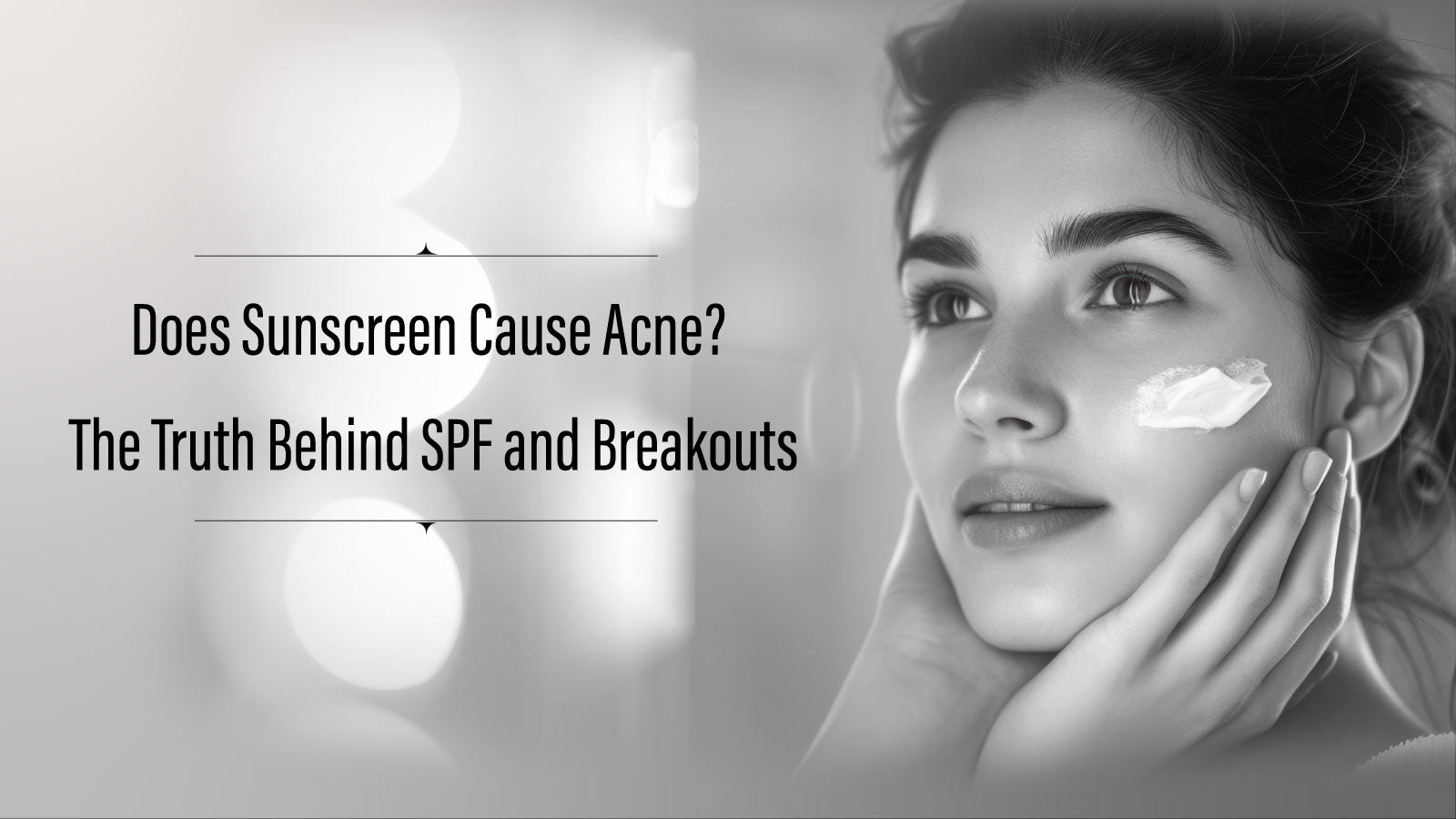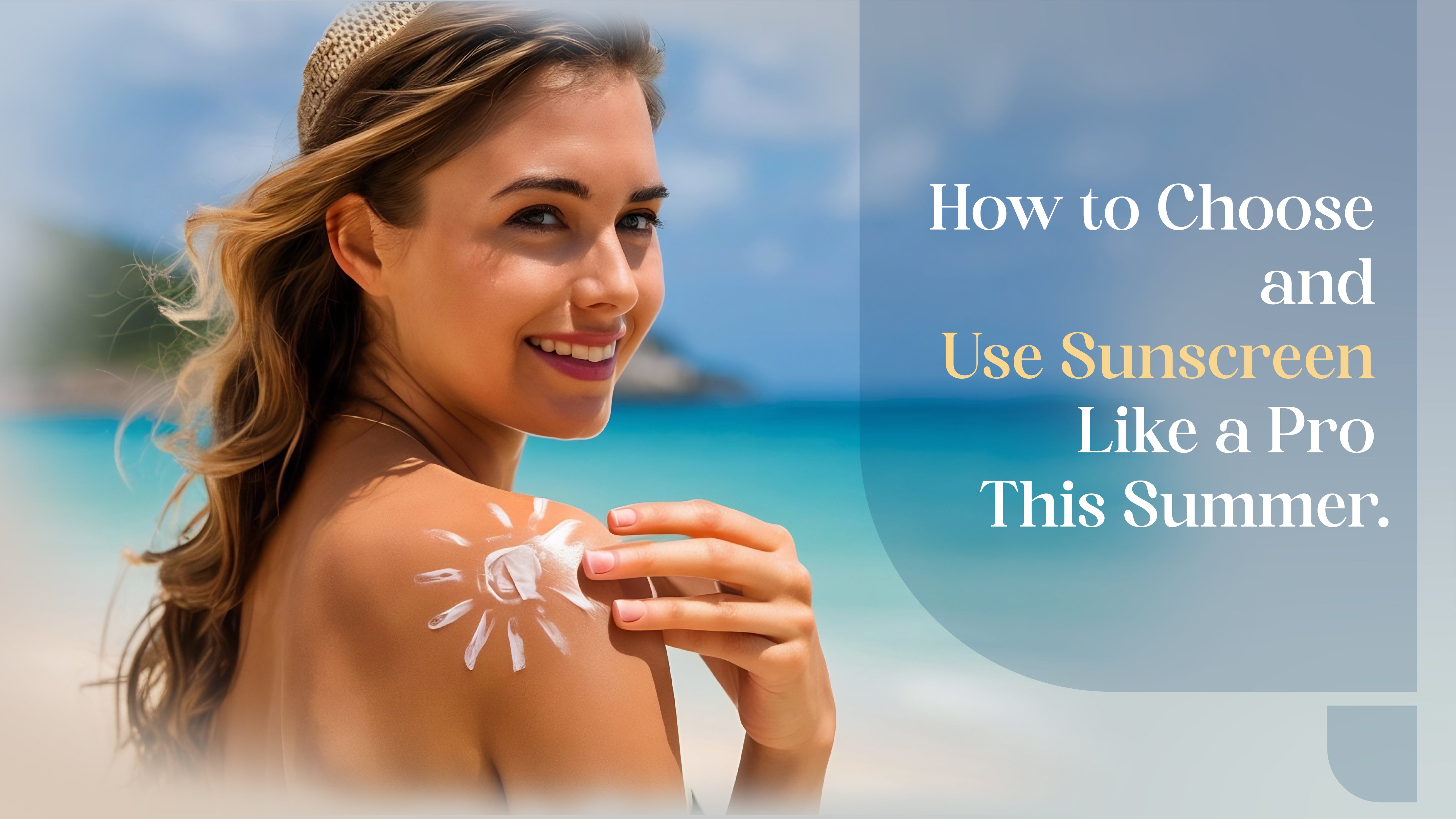
Does Sunscreen Cause Acne? The Truth Behind SPF and Breakouts
When it comes to skincare, sunscreen is a must-have for protecting your skin from harmful UV rays, preventing premature aging, and reducing the risk of skin cancer. However, for those with acne-prone skin, the question often arises: Does sunscreen cause acne? If you've ever experienced breakouts after applying sunscreen, you're not alone. In this blog, we’ll explore the truth behind sunscreen and breakouts, how to choose the right sunscreen for acne-prone skin, and some essential skin care tips to keep your complexion clear and healthy.
Does Sunscreen Cause Acne?
The short answer is no, sunscreen itself doesn't directly cause acne, but the wrong type of sunscreen can aggravate existing acne or contribute to new breakouts. The key factor here is the type of sunscreen you're using. Not all sunscreens are created equal, and certain formulations can clog pores or leave your skin feeling greasy—leading to sunscreen and breakouts.
Sunscreen and Breakouts: What’s the Connection?
Many sunscreens contain ingredients that can irritate sensitive or acne-prone skin. This is especially true if you're using sunscreens with thick formulas, heavy oils, or comedogenic (pore-clogging) ingredients. For people with oily skin or acne, these types of sunscreens can worsen the condition by trapping dirt and oil in your pores, leading to acne from sunscreen.
Additionally, sunscreens that don't suit your skin type—especially if you have sensitive skin—can cause inflammation, redness, and breakouts. That's why it's crucial to use the right sunscreen for acne-prone skin.
Choosing Sunscreen for Acne-Prone Skin
When shopping for sunscreen, look for labels that specifically say non-comedogenic sunscreen. These sunscreens are designed to be lightweight and formulated with ingredients that don’t clog pores. Best sunscreen for oily skin is often oil-free or gel-based, making it a good choice for acne-prone skin. Mineral sunscreens, with zinc oxide or titanium dioxide, are also gentler on sensitive skin and less likely to cause breakouts.
Here are some important factors to consider when choosing sunscreen:
- Oil-Free Formula: Sunscreens without oils are best for those with oily or acne-prone skin. They absorb into the skin without leaving a greasy residue.
- Non-Comedogenic: This term means the sunscreen is less likely to clog pores.
- Broad-Spectrum SPF: Choose a sunscreen with broad-spectrum protection against both UVA and UVB rays. Ideally, it should have SPF 30 or higher.
How to Prevent Acne When Using Sunscreen
If you're experiencing acne despite wearing sunscreen, there are several ways to prevent breakouts:
- Choose the Right SPF for Your Skin Type: For oily skin, opt for a lightweight, oil-free formula. Best non-comedogenic sunscreen for acne-prone skin will not exacerbate your oil production or clog pores.
- Cleanse Before and After: Make sure to cleanse your face before applying sunscreen to remove dirt, oil, and other impurities. After a day outdoors, wash your face to remove sunscreen buildup and other contaminants.
- Avoid Thick Sunscreen Formulas: Thick, creamy sunscreens can contribute to acne from sunscreen. Instead, use gel-based or spray formulas designed for oily or acne-prone skin.
- Incorporate Exfoliation: Regular exfoliation can help prevent clogged pores and breakouts. Consider using a gentle exfoliator a few times a week, but avoid harsh scrubs that can irritate your skin.
- Look for Mattifying Formulas: Some sunscreens offer mattifying properties that control oil production throughout the day, helping prevent acne.
Why Does Sunscreen Cause Breakouts on My Face?
Breakouts may occur when sunscreens contain heavy oils or comedogenic ingredients that block pores, leading to clogged pores and, eventually, acne. If you’re prone to acne, it's essential to find a sunscreen that matches your skin’s needs. Choosing sunscreen for sensitive skin can also prevent irritation and minimize the risk of breakouts.
Is It Safe to Wear Sunscreen If I Have Acne?
Yes, it is completely safe to wear sunscreen even if you have acne. In fact, skipping sunscreen can lead to more harm than good, as sun exposure can worsen acne scars and cause hyperpigmentation. The right sunscreen will help protect your skin without aggravating acne.
Best Sunscreen for Oily and Acne-Prone Skin
If you're looking for a sunscreen that works well for acne-prone skin, Phimedy Sol Protect Sunscreen SPF 50+++ is an excellent choice. This sunscreen is designed to offer high-level protection against harmful UV rays while being gentle on the skin. Its non-comedogenic and oil-free formula ensures it won’t clog pores or contribute to breakouts. Phimedy Sol Protect is perfect for oily and acne-prone skin, providing a matte finish and lasting protection throughout the day without causing irritation.
Skin Care Tips for Acne
In addition to choosing the right sunscreen, here are some essential skin care tips for acne:
- Use a Gentle Cleanser: Choose a mild cleanser to wash your face twice daily, especially if you're wearing sunscreen. Avoid harsh scrubs that can irritate acne-prone skin.
- Don’t Skip Moisturizing: Even oily skin needs moisture. Opt for a lightweight, non-comedogenic moisturizer to hydrate your skin without clogging pores.
- Apply Sunscreen Every Day: Even on cloudy days or indoors, make sure to apply sunscreen daily to protect your skin from UV damage.
Conclusion
Sunscreen itself does not directly cause acne, but using the wrong type of sunscreen can contribute to breakouts. The key is choosing the right sunscreen for acne-prone skin—look for non-comedogenic, oil-free formulas designed to protect without clogging pores. With Phimedy Sol Protect Sunscreen SPF 50+++, you can ensure your skin is protected from harmful UV rays while keeping breakouts at bay. By following proper skin care tips for acne and selecting the best sunscreen for oily skin, you can safely enjoy the benefits of sun protection without sacrificing your complexion.
Remember, SPF and acne don’t have to be a contradictory pair. With the right sunscreen and a tailored skincare routine, you can protect your skin and keep it clear of breakouts.







Leave a comment
This site is protected by hCaptcha and the hCaptcha Privacy Policy and Terms of Service apply.